Are you wondering what kind of mindset you have? It’s a very good question, and it’s worth pursuing. In this article, I will share 20+ fixed and growth mindset examples. You can use these examples to help you find out which type of mindset you have.
In an effort to illustrate two different mindsets, allow me to first describe a scenario that occurred in my classroom one year. In my opinion, there’s nothing as helpful as real-life fixed and growth mindset examples to really understand the difference.
Pin it for later! ⤵️

*This post contains affiliate links, which means I may receive a commission if you purchase through my links (at no extra cost to you). As an Amazon Associate, I earn from qualifying purchases. Please read my full disclosure for more information.
Table of Contents
ToggleReal-Life Examples of Growth Mindset and Fixed Mindset
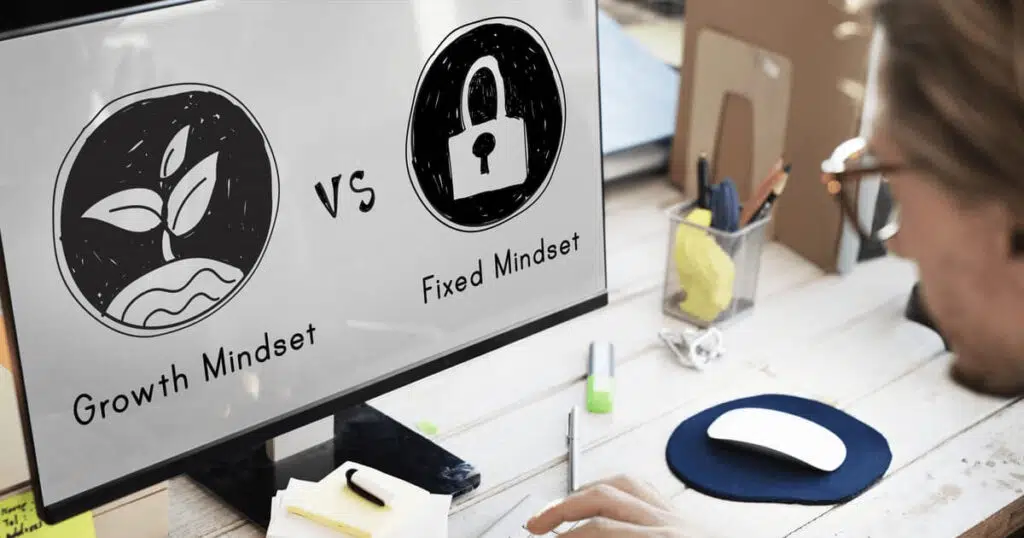
In class one day, I presented an appropriate yet challenging task to my students. Two particular students presented with two completely different reactions.
Their reactions clearly illustrate examples of a fixed and growth mindset. Pay close attention to their words, actions, and body language. Can you spot the differences?
One student, let’s call him Student A, slumped down in his seat, put his face in his hands, and moaned.
When I asked him what he was thinking, he replied “What?!? I can’t do that. It’s too hard. I give up!”
Then he proceeded to slouch down even further, looking discouraged and defeated.
The other student, who we will call Student B, had a different response. First, he sat quietly while he squinted his eyes at the task.
After a couple of moments, he said, “This does look hard. But…I think I can do it.” Then he sat up a little straighter and proclaimed, “Yeah. I think it’ll be hard, but I’m gonna try it. I think I can figure it out.”
The difference in these two students’ beliefs, thought processes, body language, and words clearly portray the difference between the two main types of mindset.
Student A became discouraged as soon as I presented the task. Even though he was capable of completing the task with hard work and perseverance, he decided to give up.
Although Student B also realized that the task would take hard work, he didn’t become discouraged. Instead, he accepted that it would be challenging, geared up to put in his best effort, and decided to give it a try.
Can you see the differences between these students in these fixed and growth mindset examples? Their words, actions, and body language clearly indicated their mindset in this situation. I’ll break this down a bit more in each section below.
What is Mindset?
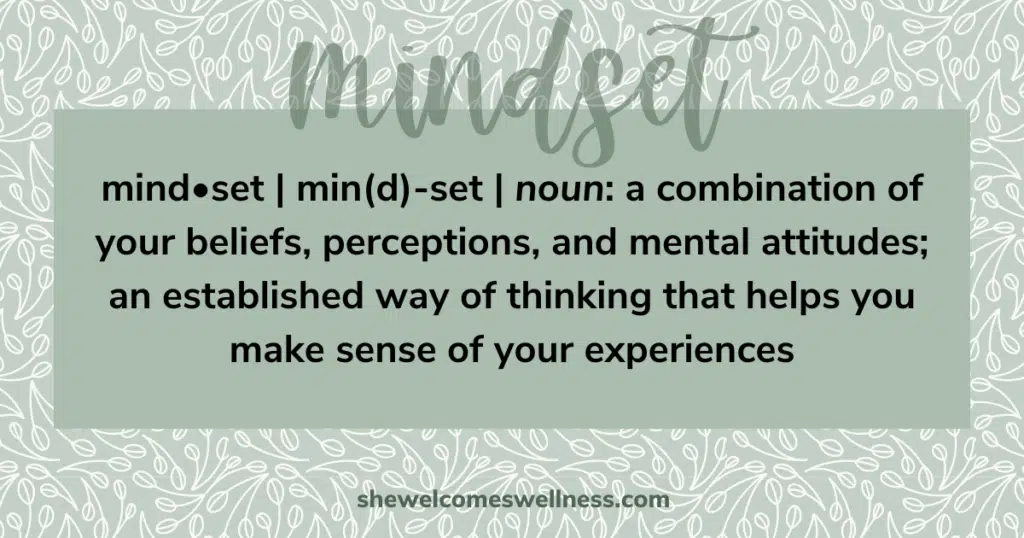
Your mindset is a combination of your beliefs, perceptions, and mental attitudes, even if you’re unaware of them. It’s an established way of thinking that helps you make sense of your experiences.
Mindset impacts how you feel, think, and react in different circumstances.
For example, in any given situation, your mindset is what compels you to act or to refrain from acting. It also influences how you see yourself and everyone around you. In addition, your mindset shapes your perception of what you’re able to do and what’s out of reach for you.
The Two Mindsets: Growth Mindset vs. Fixed Mindset
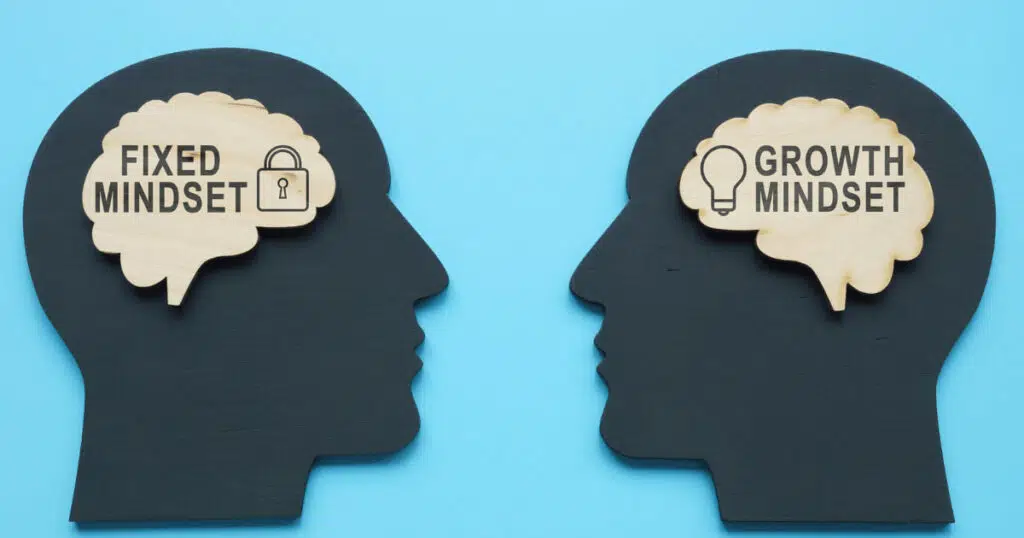
“If you look at what you have in your life, you’ll always have more. If you look at what you don’t have in life, you’ll never have enough.”
-Oprah Winfrey
Stanford Psychologist Carol Dweck, author of Mindset: The New Psychology of Success, explains that there are two types of mindset: fixed and growth.
In general, if you have a fixed mindset you’ll tend to believe that your skills or qualities are set, or fixed. You will likely think that you can’t improve or develop your intelligence, abilities, and skills over time.
Conversely, if you have a growth mindset you believe that your abilities and qualities are not fixed. You’ll think that you CAN develop your intelligence, abilities, and skills over time.
If you look at many successful people, you’ll find that one thing they have in common is a growth mindset. They realize that to achieve things in life, they have to be willing to grow, work hard, and adapt.
A growth mindset can help you better yourself, advance in your career, and achieve the things you want in life. Check out this blog post for even more reasons why mindset is important in life.
Let’s break this down with some specific fixed mindset and growth mindset examples.
Understanding Growth Mindset
As I mentioned earlier, the term “growth mindset” was coined by Carol Dweck, a Stanford Psychologist. She was researching the power of our beliefs and how changing them can impact our lives.
She found that the growth mindset is based on the “belief that your basic qualities are things you can cultivate through your efforts, your strategies, and help from others. Although people may differ in every which way-in their initial talents and attitudes, interests, or temperaments-everyone can change and grow through application and experience.”
Therefore, someone with a growth mindset believes they can become smarter. That their efforts affect their success. And that with strategies, persistence, and help they can learn and grow.
Those with a growth mindset believe their basic ability is only the starting point for their true potential. The growth mindset creates a passion for learning, rather than a constant need for approval.
If you have this type of mindset, you’ll embrace challenges because you know they are an opportunity to learn and improve. You will understand that there is always an opportunity to improve your skills.
With a growth mindset, you will choose to learn from the feedback that you receive. And you’ll likely put effort into using that feedback to help you make changes in the areas where you want to improve yourself.
Having a growth mindset means you will be less likely to feel threatened by other people’s success. Instead, you’ll be encouraged by the possibility it represents and will try to find ways to learn from their success.
In essence, having a growth mindset means you’ll be open to growth and development. You’ll believe that you can grow your intelligence and skills over time. And you’ll be willing to take the necessary steps to do just that.
Understanding Fixed Mindset
For the most part, a fixed mindset is the opposite of a growth mindset. With a fixed mindset, you’ll believe that your qualities and traits are set and you can’t change them.
You’ll avoid challenges and give up easily when faced with obstacles. And you’ll probably put little effort into changing since it seems pointless.
Having a fixed mindset will predispose you to feel threatened by the success of others. Instead of inspiring you to improve, the success of others can cause you to limit yourself. And this can lead to the desire to prove yourself to others.
Examples of Growth and Fixed Mindset and Thoughts
Growth Mindset Examples and Thoughts
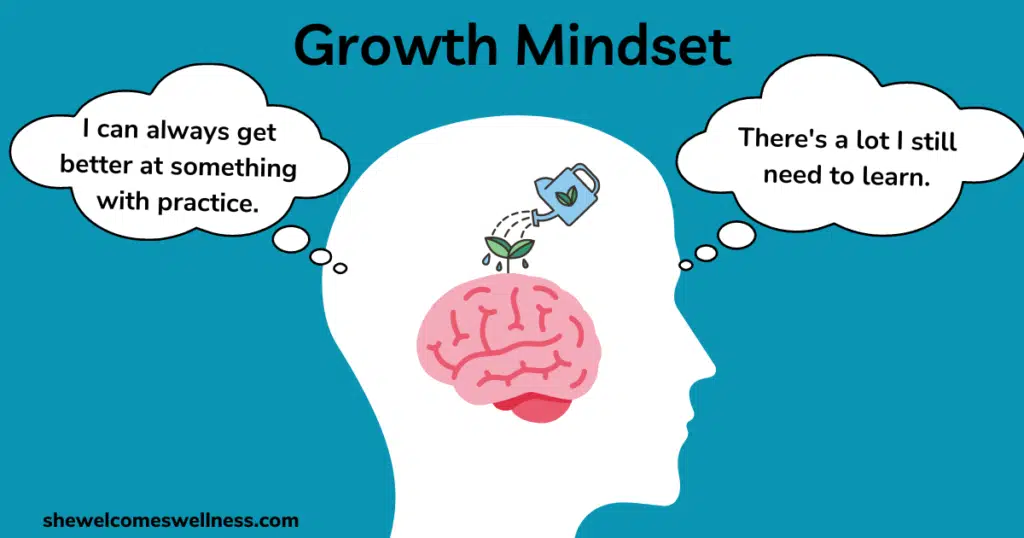
Someone with a growth mindset believes they can cultivate and develop their qualities. They understand the process includes their own hard work, efforts, and strategies. They realize it may also include help from others.
Below are some common growth mindset thoughts and examples. When you see the {words in braces}, you’ll notice that I selected areas such as writing or athletics. Feel free to exchange those words for any that are more appropriate for you.
- I can always become better at something through practice.
- I can always improve my future self.
- I see failures as opportunities to learn, reassess, and do better next time.
- I can always do better at something if I want to, but it will take effort.
- I enjoy learning and growing, and learning is a lifetime pursuit for me.
- I’m not a natural {writer}, but I can learn to get better at {writing}.
- There is a lot I still need to learn.
- Feedback allows me to learn how to improve.
- Failure is a learning curve.
“Student B” Displayed a Growth Mindset

For example 10, let’s look back at that classroom scenario I described. In that example, it was clear that Student B displayed a growth mindset. That student took the time to study the task I had presented.
He genuinely looked at it. He spent a few moments considering it. His response made it clear that he realized it wasn’t a simple task. He knew he would have to work at it to figure it out. And he was willing to do so. He rose to the challenge. Even his body language–sitting up straighter–displayed his acceptance of the challenge.
Fixed Mindset Examples and Thoughts
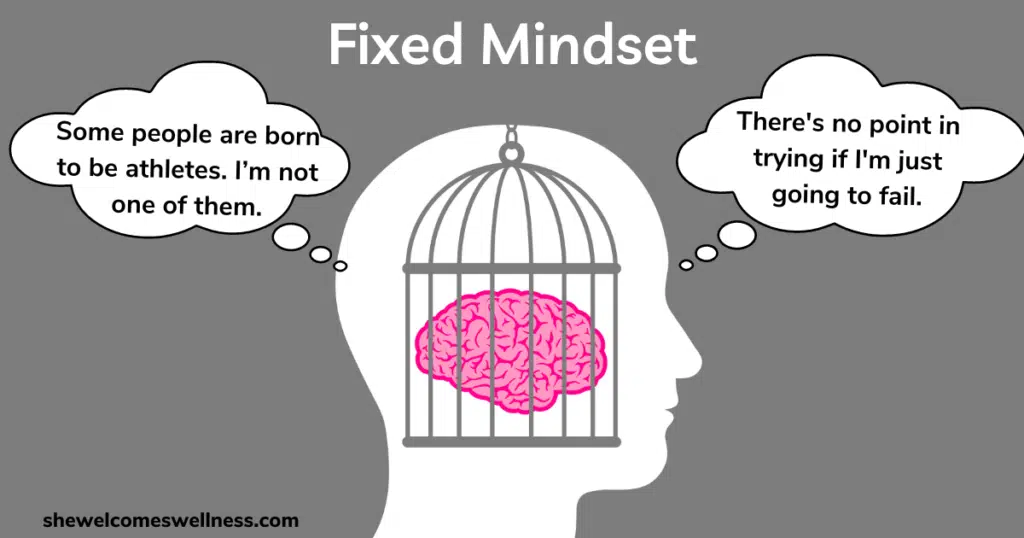
I’m sure by now you are realizing that being able to identify whether you have a fixed mindset is important. As we’ve discussed, a fixed mindset could be holding you back from your best life. So, let’s take a look at some fixed mindset thoughts and examples.
Again, when you see the {words in braces}, you’ll notice that I selected areas such as writing or athletics. Feel free to exchange those words for any that are more appropriate for you.
- Either I’m good at something, or I’m not.
- The life of my “future self” will look very much like my life now.
- I can’t learn {that} now; it’s too late.
- There’s no point in trying if I’m just going to fail.
- I always struggle with {writing}, so it’s not worth trying it.
- I’m not {artistic}.
- I’m not {creative}.
- Some people are born to be {athletes}, but I’m not one of them.
- I have learned everything I need to know.
- Feedback is criticism, and makes me feel bad about myself.
- I can’t overcome the obstacles that are in my way.
As you can see, these fixed mindset characteristics are virtually the opposite of growth mindset characteristics. When you have a fixed mindset, it can prevent you from moving forward and achieving the things you want.
“Student A” Displayed a Fixed Mindset

And for example 22, we will head back to the classroom scenario. In that example, it is plain to see that Student A displayed a fixed mindset. That student didn’t even take a few seconds to study the task I had presented. He quite literally gave up before he even understood the task.
His response made it clear that he felt it was too hard for him. Without even taking the time to discover what the task actually entailed!
He immediately believed that he couldn’t do it. Unlike Student A, he did not rise to the challenge. Take a moment to consider his body language. He slumped down in his chair with his face in his hands. His body language conveyed his immediate discouragement and defeat.
His vocalizations and words also indicated his fixed mindset. First, he groaned at the sight of the task. Remember, this was before he even took the time to analyze what he needed to do. Secondly, his fixed mindset is clear in his words: “What?!? I can’t do that. It’s too hard. I give up!”
Examples of Key Differences Between Growth and Fixed Mindset

There are several key differences between a fixed and a growth mindset.
One key difference is how someone with each type of mindset will approach or view challenges.
For example, a person with a fixed mindset tends to shy away from a challenge, often from fear of failure. They may even try to escape or hide to avoid responsibilities. This was apparent from Student A in the real-life scenario in my classroom.
On the other hand, a person with a growth mindset tends to tackle challenges head-on. They view challenges as a way to uncover valuable information about themselves. In many cases, they not only master the challenge but also move on to greater achievements. This was displayed by Student B in the real-life classroom scenario.
A second key difference is in how someone with each type of mindset faces mistakes and feedback.
A person with a fixed mindset is often embarrassed by making mistakes. They may blame others or become defensive when presented with mistakes or feedback.
In contrast, someone with a growth mindset understands that mistakes and feedback are key. They view mistakes as part of the learning process. They’re also less likely to take criticism personally. By evaluating their mistakes and accepting feedback, they’re able to improve their skills.
Common Misconceptions about Growth Mindset

There are a lot of growth mindset misconceptions out there. Awareness of the facts behind the myths is crucial to developing a growth mindset.
In fact, this is such an important topic that Dweck includes an entire section about it. I highly recommend her book Mindset: The New Psychology of Success. It’s a great tool whether you want to change your mindset or help guide the children or students in your life.
Some common misconceptions about growth mindset include:
- A growth mindset is about praising intelligence.
- A growth mindset is about praising talent or ability.
- A growth mindset is about praising the process, not the outcome.
- A growth mindset is only about effort.
- You can either have a fixed or a growth mindset.
- Fostering a growth mindset means you tell yourself that you can do anything.
- Open-mindedness or flexibility automatically means you have a growth mindset.
- It’s not possible to develop a growth mindset.
- Having a growth mindset is about being happy all the time.
- A growth mindset is the only thing you need for success.
A Few Notes About Praise
I have encountered these misconceptions about praise, especially in the school setting. Sometimes as well-meaning adults, we may praise students for everything. We do this thinking that will help build them up or give them confidence. Unfortunately, the opposite is actually true.
While there is nothing wrong with praising and rewarding, it’s about HOW and WHAT we’re praising. It’s important to praise the right way.
We should avoid praising or rewarding intelligence or talent. Instead, we should praise what Dweck calls the growth-oriented process.
In other words, the praise is on the process but it must be tied to the outcome. This includes praising and celebrating what has been accomplished through practice, hard work, strategies, focus, study, perseverance, overcoming obstacles, and resilience.
This goes for praising our students and ourselves if we want to foster a growth mindset. Doing this helps us to understand and internalize that it was engaging in the process that helped us to learn and grow.
In other words, the praise should be on the process and we must tie it to the outcome.
This includes celebrating those accomplishments. But it definitely includes celebrating the process by which you achieved those accomplishments.
That process includes your practice, hard work, and strategies. It also includes your focus, study, and perseverance. It includes your resilience: the way you persisted when faced with challenges. And how you worked to overcome obstacles.
By praising in this way, we can internalize how engaging in the process helped us learn and grow.
How Your Mindset Affects Your Life
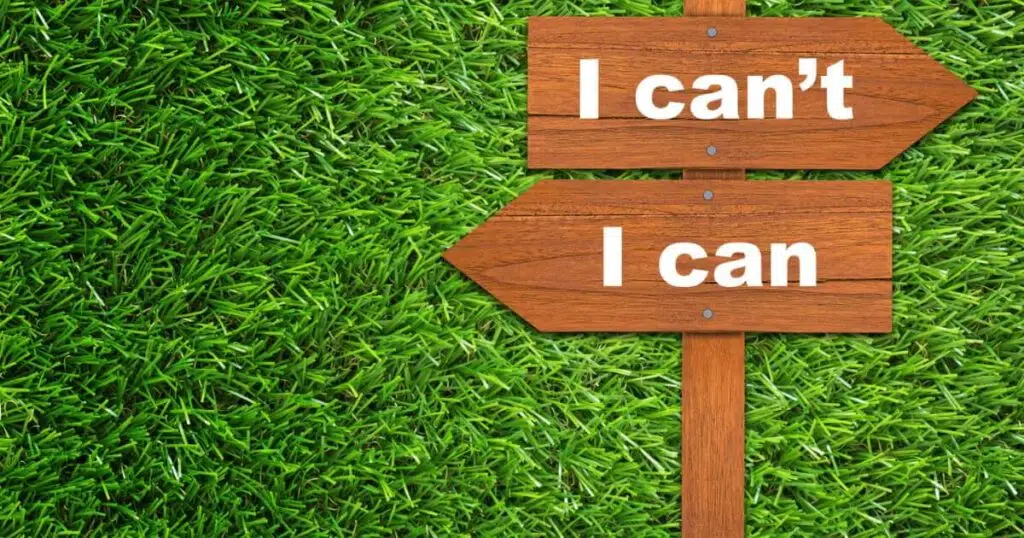
So, why does it matter what type of mindset you have? Well, there are a number of ways your mindset can impact your life.
Having a fixed mindset can negatively impact your life. It may:
- Cause you to give up on your dreams
- Prevent you from trying anything new
- Keep you stuck in a job or relationship you don’t love
- Prohibit you from achieving success
In contrast, having a growth mindset can positively affect your life. It may:
- Help you to learn new things
- Increase your chances of success
- Cause you to go after your dreams with perseverance
- Allow you to see bigger and better opportunities
- Empower you to achieve success
So, if you are looking to improve your life and achieve your goals, a growth mindset is essential.
Summary
Now that we’ve covered over 20 growth and fixed mindset examples, have you determined which kind of mindset you have?
Keep this thought in mind as you’re deciding. Even people who typically identify as having a growth mindset will have a fixed mindset at times. Yep, that’s totally normal.
It’s not about being in a growth mindset 100% of the time. It’s about paying attention to your mindset in different situations. And becoming aware of your triggers so you can make better choices.
If you already have a growth mindset in some areas, you can continue to develop and improve upon that.
But if you primarily have a fixed mindset and genuinely want to change, you absolutely can. It will take practice and determination. You’ll need to become aware of your thoughts.
One good way to do that is to keep these fixed and growth mindset examples in mind. With time and practice, you’ll start anticipating the reactions you’re likely to have. And then you can make conscious changes to your thoughts and actions as needed.
In the next article in this series, we’ll cover specific steps you can take to begin to develop your growth mindset. Just know that it is not a “quick fix.” It will take time…it will be a journey. And it is so worth it.
I’d love to hear from you: Do you relate more with the fixed mindset or growth mindset examples?
Pin it for later! ⤵️



22 Responses
I was a teacher and constantly talked about a growth mindset with my students, but it didn’t come naturally to me. So I have to change my thinking intentionally. This is a helpful post with many examples to help people understand the concept.
I can completely relate to what you’re saying! In some areas of my life, I find that a growth mindset is my default. But in other areas, I have to be more intentional and focus on my thoughts and the feelings they stir up. Thanks for taking the time to comment!
Very interesting! Thanks for giving me something to work on.
I’m so glad you found this helpful! We are all works in progress, and that’s a good thing! 🙂 Thanks for taking the time to comment.
Such a great read, thank you! I love how you said your basic ability is only the starting point of your true potential.
I’m so glad you found it helpful. I really appreciate you taking the time to comment!
This was amazing and really struck home for me! I always strive to have a growth mindset and pursue passions of money even though they are hard. 🤗
I’m so glad! It’s great to be aware of your mindset and to strive to have a growth mindset! It’s especially true when the challenge we’re taking on is difficult. Thanks so much for taking the time to comment.
I think I mostly have a growth mindset but I’m still working on improving myself. Great examples. Thank you for sharing!
That’s great that you mostly have a growth mindset! It’s important to be aware of our mindset, so we can pivot where needed. Thanks for taking the time to comment.
Very interesting read, I like how you approached the fixed and growth mind set and the visual impacts that can be seen of each mindset. Such as when you said the “two students’ beliefs, thought processes, body language, and words clearly portray the difference between the two main types of mindset”. I agree what we think has a clear impact on what we do and how we approach the idea of failure, or in other words, trying something new.
I’m so glad you enjoyed this article. Thank you for taking the time to comment!
great advice
Thanks for taking the time to comment!
This is incredibly helpful. Thank you so much for sharing.
I’m so glad you found it helpful!
Such a great, informative post! I unfortunately at times have a fixed mindset and I am trying hard to correct that.
I can relate! I definitely find myself in a fixed mindset in certain areas, too. Awareness is key–once we realize it, we can overcome it.
This is a valuable postt. Having a growth mindset is pretty important to achieve anything in life. Thanks for sharing!
I’m glad you found it valuable! Thanks for taking the time to comment! 🙂
Interesting read, mindset makes such a difference. I recently did a post on money mindset which uses similar analogies.
I’m glad you found the post interesting! I’m looking forward to reading your post–thanks for letting me know about it!